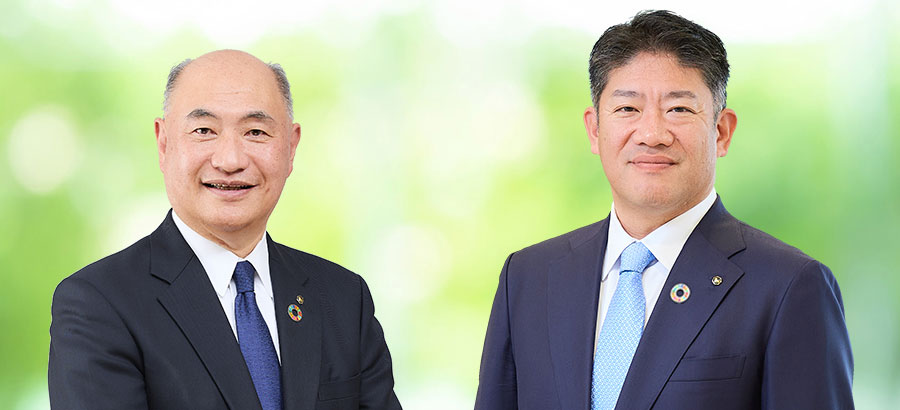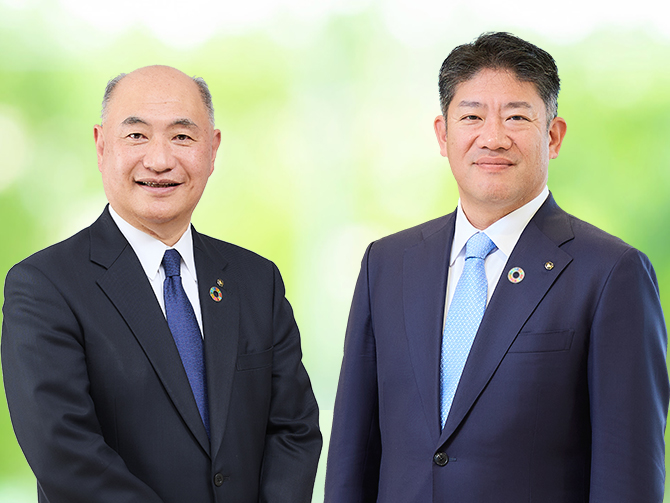

Since Lion’s founding in 1891, it has striven to help consumers realize health, comfort, cleanliness and hygiene in everyday living by redesigning habits and providing the various daily commodities necessary for such habits in line with its unchanging mission of “benefitting society through business activities.”
In Northeast Asia, various challenges arising from aging populations, such as increasing medical costs, are becoming apparent, while in Southeast and South Asia, health and hygiene habits must be improved in accordance with the level of economic development. At the same time, dealing with global environmental problems cannot be put off any longer. In light of such rapid changes in the business environment and to precisely deal with diverse emerging social issues, continuously generate business value and contribute to society going forward.
Based on our purpose, “Make a difference in everyday lives by redesigning habits: ReDesign,” we formulated a long-term strategic framework, Vision2030, aimed at achieving our management vision, “Becoming an advanced daily healthcare company.”
Under Vision2030, we are advancing initiatives that address our Sustainability Material Issues to create social and economic value and achieve sustainable corporate value enhancement. Of these, we have positioned “Creating Healthy Living Habits,” which contributes to the realization of everyday happiness, and “Promoting Environmental Initiatives for a Sustainable Planet” as our top priority material issues, and we are investing management resources in these areas accordingly. Habits have great power. Daily chores take up the majority of our time, and by transforming this drudgery into positive experiences, or positive habits, we can increase the sum total of our happiness. Specifically, in 2019, we established the LION Eco Challenge 2050 environmental objectives. These objectives put into words our dedication to working in partnership with all stakeholders to realize a decarbonized, resource-circulating society. We believe that promoting a wide range of environmentally friendly habits and products that reduce environmental impact in the home is one effective way that Lion can contribute.
Going forward, we will continue to accelerate our growth strategies by leveraging our strengths of wide-ranging insight gleaned through the redesign of living habits as well as marketing and R&D capabilities based on consumer perspectives. By doing so, we will contribute to the achievement of the Sustainable Development Goals as well as to health, comfort, cleanliness and hygiene in everyday living and the realization of a sustainable society.
Masayuki Takemori
Representative Director,
President and Executive Officer
Chief Executive Officer


Society and the global environment are undergoing profound changes. From climate change and resource depletion to widening social and economic disparities, the issues we must confront are urgent and numerous. In this context, the Lion Group is advancing initiatives to address its Sustainability Material Issues by integrating them into management strategy , with the aim of helping resolve social issues and promoting the sustainable growth of its businesses.
We have identified 13 Sustainability Material Issues that serve as a roadmap for creating value in businesses in which the Group has an advantage, and for fulfilling our corporate social responsibilities. Within this roadmap, the Group has positioned “creating healthy living habits” and “promoting environmental initiatives for a sustainable planet” as top- priority material issues in which the Group must invest management resources to secure a competitive advantage.
The Group promotes sustainability initiatives rooted in its purpose—“Make a difference in everyday lives by redesigning habits: ReDesign.” People’ s everyday habits are the key . For example, according to the United Nations, on a consumption basis 65% of CO2 emissions come from households, suggesting that households play a crucial role in achieving significant emission reductions.*1*2 We strongly believe that people’s habits have the power to help resolve social issues, and that creating habits among consumers that promote healthy lifestyles and reduce CO2 emissions can drive major changes.
To create healthy living habits, one of our top-priority material issues, we are focusing on instilling tooth brushing and other oral healthcare habits that are directly related to day-to-day health, as well as cleaning and hygiene habits such as hand washing. Our objective is to provide the 1 billion people across Asia, including Japan, in the areas that the Lion Group serves with products, services and information that help to create healthy living. Going forward, we will accelerate efforts to achieve this objective by increasing collaboration with overseas Group companies. In particular , in our core oral healthcare business we aim to create new markets and expand the scope of the business through products and services that leverage digital technologies.
In promoting environmental initiatives for a sustainable planet, we are encouraging habits that promote the mindful use of water and the reduction of plastic waste. By proposing planet-friendly lifestyles, we contribute to the achievement of a decarbonized, resource-circulating society . Many of our products involve water use. Supplying clean tap water and treating wastewater both require energy . In this regard, using fewer rinse cycles when doing laundry reduces water consumption and contributes to lowering CO2 emissions. Recognizing the value of plastic as a useful material, we are also working to expand partnerships aimed at achieving plastic resource circulation. This includes advancing recycling technologies for refill containers and building recycling systems in collaboration with local governments and other companies.
The Sustainability Promotion Council works to ensure that the resolution of these two top-priority material issues contributes to business growth. Its efforts include integrating sustainability promotion into management strategy , making decisions on specific action plans related to the environment, society , and governance, and monitoring progress toward the Group’ s 2030 goals. Working to fulfill our purpose and leverage our unique strengths, we will steer the Group toward sustainability in management. Through the creation of better habits, we intend to contribute to society and achieve further business growth.
Sources:
*1 United Nations Environment Programme (2020). The Emissions Gap Report 2020. Nairobi.
*2 Ivanova, D., Stadler, K., Steen-Olsen, K., Wood, R., Vita, G., Tukker, A. and Hertwich, E. G. Journal of Industrial Ecology, 20(3), 526-536 (2016)
Eiji Nishinaga
Executive Officer